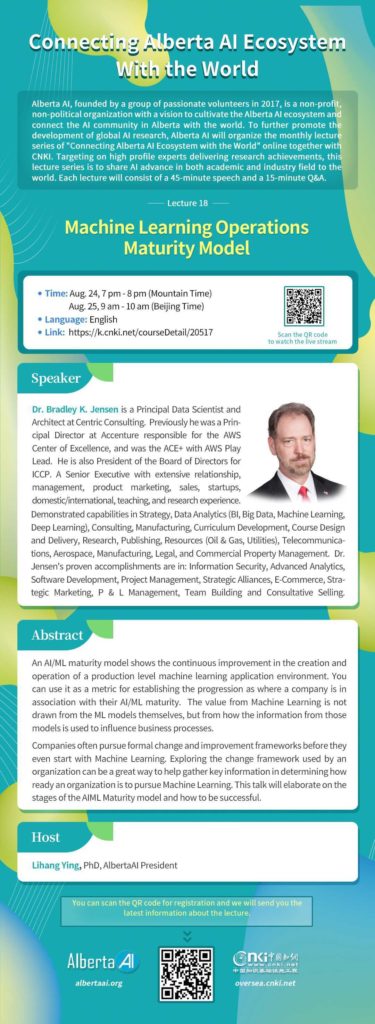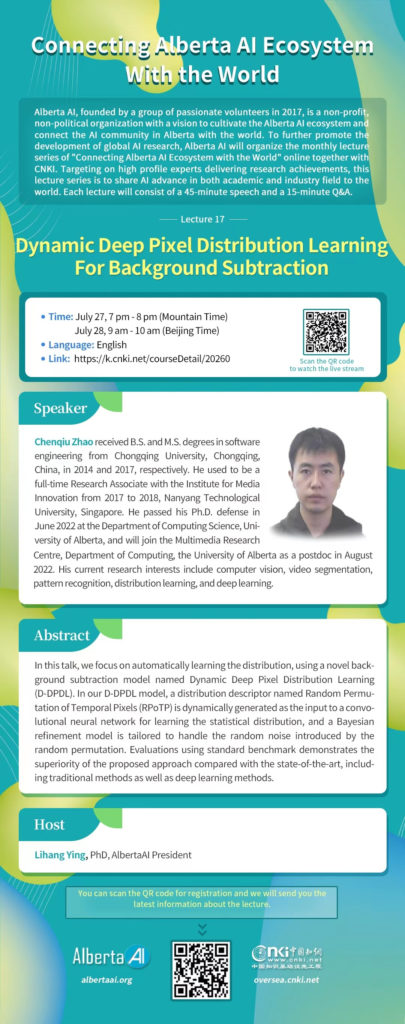Webinar: Machine Learning Operations Maturity Model
Speaker: Dr. Bradley K. Jensen


Speaker: Dr. Bradley K. Jensen


| Speaker: Chenqiu Zhao received B.S. and M.S. degrees in software engineering from Chongqing University, Chongqing, China, in 2014 and 2017, respectively. He used to be a full-time Research Associate with the Institute for Media Innovation from 2017 to 2018, Nanyang Technological University, Singapore. He passed his Ph.D. defense in June 2022 at the Department of Computing Science, University of Alberta, and will join the Multimedia Research Centre, Department of Computing, the University of Alberta as a postdoc in August 2022. His current research interests include computer vision, video segmentation, pattern recognition, distribution learning, and deep learning. Abstract: Previous approaches to background subtraction usually approximate the distribution of pixels with artificial models. In this paper, we focus on automatically learning the distribution, using a novel background subtraction model named Dynamic Deep Pixel Distribution Learning (D-DPDL). In our D-DPDL model, a distribution descriptor named Random Permutation of Temporal Pixels (RPoTP) is dynamically generated as the input to a convolutional neural network for learning the statistical distribution, and a Bayesian refinement model is tailored to handle the random noise introduced by the random permutation. Because the temporal pixels are randomly permutated to guarantee that only statistical information is retained in RPoTP features, the network is forced to learn the pixel distribution. Moreover, since the noise is random, the Bayesian theorem is naturally selected to propose an empirical model as a compensation based on the similarity between pixels. Evaluations using standard benchmark demonstrates the superiority of the proposed approach compared with the state-of-the-art, including traditional methods as well as deep learning methods. Click here to join or watch the recording. |


Addressing Bias and Error in Neural Networks using Up-sampling and Confidence


Alberta AI is looking for Machine Learning Bootcamp Tutor. Please find the details in the file below.

Click here to register.

Click here to register.
PYTHON & AI level 1 (online).
Organizer: AlbertaAI & ICAN Association
Instructor: Yongzhe Hong, MD, MSc, PhD
Dr. Hong is currently working as a data analyst in the division of Cardiac Surgery at University of Alberta. He is the co-founder and AI mentor of the AlbertaAI. He has more than 9 years of experience dealing with large population-based health data. Dr. Hong applied a variety of statistical methods for primary and observational studies, including descriptive analysis, survival analysis, time series analysis, longitudinal analysis, and risk adjustment and modelling.
Skill level: Beginner
Duration: 4 Saturday morning, 9am – 12 pm MT, 3 hours/week, Jan 23 & 30, 2021 and Feb 6 & 13, 2021
Certificate: offer the course certificate to those participants who pass the exam.
Dr. Hong’s class will introduce the basic concepts of programming in Python using the popular Jupyter Notebook, and the classes included some advanced functionality available in Python by demonstrating numpy, scipy, matplotlib, seaborn and pandas code. At the end of the course, Dr. Hong will give a very good introduction to artificial intelligence(AI). Class details are listed as below:
* Class 1(3 hours) Installation of Anaconda Individual Edition, Python syntax, data types
* Class 2(3 hours) Python Functions and help, lists, loops and conditionals
* Class 3(3 hours) Python Function, Modules, and Numpy, Scipy and Pandas
* Class 4(3 hours) Python matplotlib and seaborn and AI Foundations
This is a very helpful classes for people at beginner level. This course increases the awareness of Python, data analysis, any AI, and helps diversify Alberta’s economy in the future. For those who lost jobs or new graduates who could not find a job due to this pandemic, it is a great opportunity to open the door for them to the data analysis, data science and AI world.
This Course Certificate could be used not only for job search as a training experience but also counted as the Continuing Professional Development Hour (CPD) for Alberta Professional Engineers (P.Eng.) to keep their P.Eng. designation (CPD is a requirement to keep P.Eng).